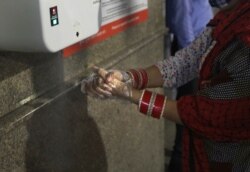India now has the second-highest number of COVID-19 cases in the world after a week in which it added nearly half a million new infections.
Indian health authorities said Monday the country’s coronavirus tally had passed 4.2 million, overtaking Brazil’s and putting the populous Asian nation only behind the United States.
“The surge was unavoidable. It was always going to be an avalanche and the avalanche has not hit the ground yet,” warns T. Jacob John, a prominent virologist and former professor at the Christian Medical College in Vellore. He says cases will continue to climb for some time in a country of 1.3 billion people and densely packed cities.
India’s tally of daily new infections has been the highest in the world in recent days – it reported over 90,000 cases on Monday.
Subways open but few takers
Signaling that the country needs to focus on reviving its battered economy, authorities in several cities including the capital, New Delhi, resumed subway services this week after more than five months off.
But the relentlessly increasing caseload has made people nervous -- not too many commuters found the courage to ride the once-crowded metro trains in New Delhi on Monday, although authorities have announced a series of new safety protocols.
New Delhi’s subway used to carry about 2.6 million people daily. It ran only partial services on Monday but authorities hope to have it running fully by the end of the week.
Wearing masks and using smart cards that can be digitally recharged is mandatory. Commuters enter stations after thermal checks, they can only sit on alternate seats, and the trains stop for longer at stations to avoid jostling in the rush to climb in or out. Security personnel, also wearing masks and face shields, have been deployed at stations to enforce regulations.
Metro officials have said fresh air will be regularly pumped into the coaches to improve air circulation and stations will be disinfected every four hours.
“We are on our way. It’s been 169 days since we’ve seen you!,” the official Twitter account of Delhi Metro tweeted. ‘Travel responsibly and commute if its only necessary.”
Bars set to reopen
The subway’s opening was yet another signal that India can no longer afford to shutter its cities – New Delhi is giving the go-ahead to bars to reopen later this week.
Although shops and other business activities have resumed, the locked-down public transport in cities meant that markets have seen few customers.
“While lives are important, livelihoods are equally important,” Rajesh Bhushan, the top official of India’s federal health ministry said at a news briefing last week.
According to estimates by the Center for Monitoring Indian Economy, some 19 million jobs have been lost in the formal economy since India imposed a stringent lockdown in late March. Worryingly, say economists, younger people have been hit the hardest -- 4 million Indians under the age of 30 have lost jobs, according to a report by the International Labor Organization.
Critics have questioned the economic price that the long shutdown has extracted, saying it delayed but did not stop the spread of the highly contagious virus.
“The peak should be around the corner now. But you cannot breathe easy post peak also because the numbers will only climb down very slowly,” according to virologist John.
For India so far, the silver lining has been the relatively fewer fatalities due to the virus -- it has recorded 71,642 deaths, far fewer than in Brazil and the United States.






